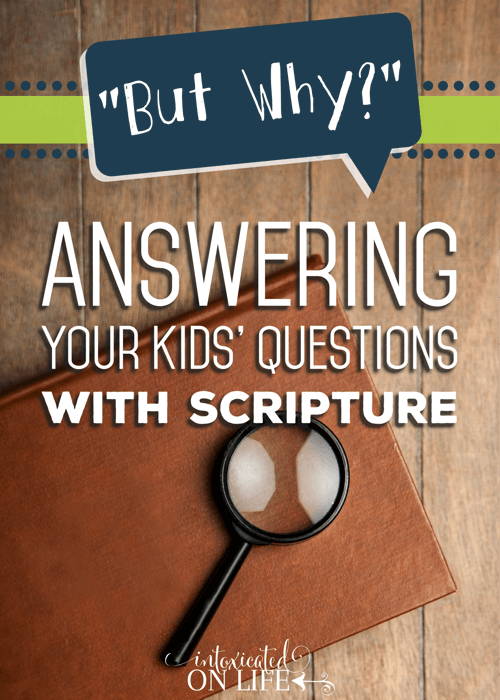Ah, the three-letter-word that’s music to every parent’s ears:
“Why?”
(It’s three letters if you’re lucky. Oftentimes, it’s more like ten: “Whyyyyyyyy?”)
So how can you respond without losing your temper or your sanity – or both?

The answer is likely found in one of the three D’s:
Dominate
I’m in favor of the occasional “because I said so.”
I don’t say it often (and I don’t recommend that you do, either), because I want my kids to know that I have good reasons for what I say. The boundaries and expectations I have in place aren’t arbitrary, and my reasons can stand up to their questioning.
But on rare occasions, the “whys” persist after sound answers have been given. When it becomes clear that there’s no sincere question, but rather a challenge to parental authority, a swift, matter-of-fact “because I said so” can bring an end to the matter.
Defer
Certain-aged children can run parents ragged with genuine “whys” (to which all the preschool moms say, “Amen!”). Even as they age, some kids have a tendency to ask the question more than others.
If you’re not in the right frame of mind to answer yet another “why,” there’s nothing wrong with deferring the question for a later time. It might sound something like this: “That’s a great question! I want to answer it for you, but I’m not going to answer any more questions until after dinner. Let me make a note of it here on the fridge so we can remember to talk about it later.”
Deferring is also helpful if your child asks a question and you don’t know the answer. There’s no shame in not knowing! It happens to all parents, and it’s better to find out the truth before answering than to make something up, and have them call you out on it later (voice of experience here – ahem).
Discuss
We’ll park here for a while, because this ought to be our far and away most common response to a child’s genuine “why.”
It can be hard, because as we’ve said, the “whys” sometimes come relentlessly. But what would happen if we changed our minds about the “whys”? What if we chose to see “why” as an open door?
After all, isn’t there a wealth of information we long to impart to our kids? Truth to convey? Wisdom to share?
We all know that nothing shuts down a child’s attention like a lesson or a lecture, no matter how beneficial, eloquent, or logical. But when kids pose the “why” question, they’re offering us an engraved invitation to communicate truth.
Believe it or not, many of your child’s questions can be answered using the Bible. And the more we use God’s Word as a basis for common conversations with our kids, the more Christ-centered their worldview will be.
Answering 10 Common “Whys” with the Bible
Here are ten common “whys,” and the biblical principles you can point to as you discuss the answers.
1. Why do I have to obey?
God puts parents in charge (Ephesians 6:1) as a good gift to children (Proverbs 1:8-9). Foolishness is bound up in a child’s heart (Proverbs 22:15), and though parents don’t know it all, they’re (hopefully) wiser than their kids.
2. Why do I have to do chores?
God assigned people work from the very beginning (Genesis 2:15), and once we enter a relationship with God, the purpose of life is fruitful labor (Philippians 1:22).
3. Why can’t I keep my face glued to this screen?
Time is a gift, and God expects us to steward it well (Ephesians 5:15-17).
4. Why do we have to have school?
(Am I the only homeschooling mom who has to answer this question all the time?!)
The ability to learn is a gift to be stewarded (Proverbs 1:5; 9:9). Part of a child’s “fruitful labor” (Philippians 1:22) is to invest in his education. On the other hand, fools despise wisdom and instruction (Proverbs 1:7).
5. Why can’t I eat _____________ (insert tasty junk food)?
Our bodies are the temples of God, and taking care of them brings God glory (I Corinthians 6:19-20).
6. Why can’t I listen to that music/play that game/watch that movie or show?
Our entertainment affects our hearts and our minds, and that matters to God (Proverbs 4:23; Philippians 4:8)
7. Why do people get sick/die?
God created a world without sickness and death. These things entered the world as a result of man’s sin (Romans 5:12).
As far as individuals are concerned, sometimes people become sick because they’re not stewarding their health well (I Corinthians 6:19-20). Other times, there’s no clear cause. But God has a reason for everything He allows into our lives (Romans 8:28), and we can trust His goodness to prevail, even when we’re in bad circumstances (Psalm 145:9; Psalm 84:11).
8. Why do people do bad things?
Sin entered the world through Adam’s sin (I Corinthians 15:21), and so all people are born with a sin nature (Ephesians 2:3). No person is exempt from sin (Romans 3:23). In fact, even the good things we do are called “filthy rags” (Isaiah 64:6). Though some sins have much greater ramifications than others, all sin keeps us from the divine relationship we were created for. God, in His grace, made a way of reconciliation through His Son, Jesus Christ (2 Corinthians 5:18).
9. Why do I have to go to church?
God intends for His people to be in fellowship with each other, and to meet together regularly for time centered around worship and His Word (Hebrews 10:25)
10. Why do I have to share?
God wants us to prefer others over ourselves (Philippians 2:3). It pleases the Lord when we share what we have with those who are lacking (Hebrews 13:16; Luke 6:29-30).
Now it’s your turn! What “why” questions are most common in your house? How do you respond?










My daughter’s in the “why?” stage. The other day I had to explain to her why people die. Interesting talk that made me realize that I want her view of death and heaven to be very different than the sad one my parents gave me. Thanks for the tips on handling this stage of her life!
Hi, Jelli, and welcome! I’m glad you found some truth here to apply – it sounds like your daughter will give you lots of practice! 😉
I think one of my favoured “why” questions as a child was usually about chores 😛
You and me both! 🙂 And I believe my kids take after their mother in that respect. Ahem.
I love this! So glad to see gifted writers like you putting it out there for parents to soak up.
I taught Biblical Worldview 15 years ago when there wasn’t any “curriculum” to use and we had to write out own 🙂
If we don’t answer their “why” questions, eventually they may decide they can’t be answered with Scripture. And #7 and #8 are major. Junior high kiddos always wanted me to camp out there, so I ended up spending a month or more just on digging into all the Word says on those.
Again, beautiful!
Thanks so much, Christi! If we don’t strongly ground our kids in God’s Word, the world will certainly offer them plenty of other substitutes; but “all other ground is sinking sand,” isn’t it? How I praise our Lord for the gift of His Word! Thanks for reading, and for chiming in. 🙂